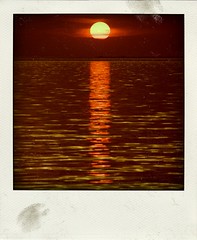
Certain things happen to an individual who acts as a steward of this particular word, domain, or an entirely new field of science called Exoplanetology. It is new, and quite odd, having been derived from an alien-sounding word -- exoplanet, it ended up sounding humorous and brings up a cultic or thingamaphoooey tone. Yes, it is totally out of this world, but it is a word whose time has come.
Exoplanetology is unique. It is the overall Thought and study of external planets relative to the Sun and our home planet, but it will always involve our own planet, because it is relative to Earth. So there will always be a "personal" touch.
When I decided to take stewardship of the word (and domain), this word has taken hold of the mind of it's steward. In the process of developing this website, a certain kind of Thought began to pervade my mindset, as I became immersed in thinking about the earth, planets, exoplanets, new worlds, suns, galaxies, and life.

Could it be what we might call "Exoplanetary thinking"? Because I never think of the Sun the same way again. It is a star, one among billions, and I am standing on one of it's planets - a habitable one for me and all life I share it with.
On the other hand, I never gaze at stars thinking the same way again. They are other Suns, sign-posts for other solar systems with their own planets and moons, and possibly - Life.
I never looked at the horizon the same way again, with the setting or rising sun radiating marvelous rays, almost saying that just like light, the imperative of life is to spread far far away from where it started before it gets extinguished by the very spark that sustains it.
I never looked at the ocean and it's waves the same way again, that it is a magnificent experience just to feel the wind and the water and know that it is the whole planet touching my face.
I never took a deep breath the same way again, without the thought of mankind's responsibility for the planet, and the future of the biosphere at the hands of humanity.
Words will not fully express the mindset of an exoplanetary thinker. It will not suffice to tell of how one's view of earth gets changed by the knowledge of other worlds around other suns, and the idea of life in those planets, all this amidst the ongoing peril of one's home planet to the growing threat of runaway global warming.
It's been said that life is what we make it, thus we are at the cusp of a magnificent period in the history of mankind, where our history joins with the history of cosmic life, or it may well be the end.
We are at the edge of a revolution that is as great, if not greater than the Copernican revolution, or we may be one great tragedy.
Whence it was the realization that we are not the center of the world, or the universe, this time we will realize - we are not center of Life (and of Intelligent Life), but we have become the steward of life in our small corner of the galaxy, a special role to fulfill.
We are at a decision point where we could end up as another extinct civilization - an interesting subject of study for alien intergalactic historians and explorers. Or we could be those future extrasolar and intergalactic explorers, if we learned the proper stewardship of life.
We are at the crux of history and we are undergoing a shift in global and planetary thinking. Our children will grow up in a world knowing they are interplanetary citizens and awesome stewards of life. Welcome to the future and welcome to a brave new world.
And with
Exoplanetology, I welcome you to the era of new worlds.
 What a memorable day it was! December 12, 2008 (12/12/08) The brightest full moon, the earliest sunset, and the launch of Exoplanetology.com under the romantic moonlight with my beloved wife. Interestingly, news about exomoons came the day after.
What a memorable day it was! December 12, 2008 (12/12/08) The brightest full moon, the earliest sunset, and the launch of Exoplanetology.com under the romantic moonlight with my beloved wife. Interestingly, news about exomoons came the day after.



